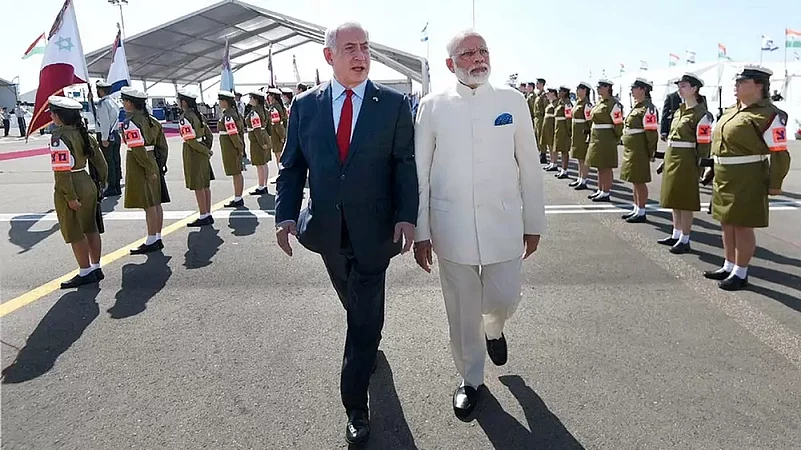When Hamas, the Palestinian Islamist militant group in Gaza, launched its surprise attack on Israel, the Jewish nation declared a “state of war”. Subsequently, Prime Minister Narendra Modi conveyed his “solidarity with Israel” in the difficult hour of what he called a “terrorist attack”. But India’s firm stand in support of Israel is a fairly new development that emerged mainly in the 1990s. Prior to that, India was one of the early supporters of Palestine.
India, which has traditionally vouched for the two-state solution to end the long-standing crisis, still supports the humanitarian cause of Palestinians but in light of the rise of the strategic ties with Israel, the country’s backing for the Palestinian population has significantly diminished. New Delhi has never condoned Hamas’ actions but as the trend lately suggests, it has failed to highlight the plight of the civilians in Gaza.
History Of India-Palestine Relations
The Indo-Palestinian relations date back to even before India’s independence. Mahatma Gandhi was one of the first prominent faces in the subcontinent to support the Palestinian cause. In 1938, Gandhi wrote an article on Jews in Harijan, where he said, “Palestine belongs to the Arabs in the same sense that England belongs to the English, or France to the French.”
During India’s independence in 1947, it supported the liberation of Palestine primarily on the principles of self-rule because in the same light as it saw its own freedom struggle and partition of British India. It was one of the three non-Arab countries to vote against the UN resolution for the state of Israel. Both Jawaharlal Nehru and Mahatma Gandhi were staunch supporters of the Palestinian cause and opposed religious exclusivity.
In 1950, India ultimately swayed to support Israel’s admission to the UN after Turkey and Iran voted in favour. However, it still refrained from exchanging diplomatic representatives at any level. In 1953, Israel was permitted to set up the first consulate in Bombay.
The Era Of Indira Gandhi And Rajiv Gandhi
India’s support for the Palestinian struggle continued during Indira Gandhi’s tenure. In the 1960s, as the Palestine Liberation Organisation (PLO) emerged as the representative for Palestinians under Yasser Arafat, India developed its engagement with Al Fatah, which was the largest political grouping under the PLO. Arafat used to frequently visit Delhi as well.
In 1974, India became the first non-Arab state to recognise PLO as the sole and legitimate representative of the Palestinian people. Indira Gandhi had told an interviewer that it was not for any economic reasons but was rather a political move as “we feel that injustice has been done”.
In 1975, the first PLO office was set up in New Delhi, followed by a full-fledged embassy in 1980.
When Gandhi’s government fell and Janata Party came to power, there were speculations of a shift in dynamics but both Vajpayee and Desai remained supportive of a peace initiative between Arabs and Israel.
Gandhi’s return to power in 1980 brought back staunch support for Palestine and the PLO. She even visited Arafat’s headquarters in Tunis after a state visit to Libya. When she was assassinated in 1984, Arafat was seen at the funeral as he wept in public. Rajiv Gandhi continued the same stance and in 1988, India became one of the first countries to recognise the ‘State of Palestine’.
The Shift In Dynamics
India’s stand on the Palestinian movement suffered a few hiccups, the first being the Arab countries’ neutral position on the 1962 India-China war and then their support to Pakistan during 1965. Israel, on the other hand, helped India with arms and ammunition in the 1962 and 1965 wars.
By the late 1980s, there was a factional change in the Palestinian movement and in 1990, following Iraq’s invasion of Kuwait, the situation in West Asia witnessed a sea of change as PLO lost its political hold when it supported Saddam Hussein. The Soviet Union collapsed subsequently and India had to rethink its stance on the issue.
Outlook’s Seema Guha has earlier reported that since 1992, as India and Israel scaled up diplomatic ties, political relations with Tel Aviv flourished. “Israel is now a defence supplier to India and is also involved in agriculture. People-to-people contacts are flowering. New Delhi continues to pay lip service to the need for Palestine’s right to exist as an independent country, yet can do little to promote this. So while making the right noises at the UN and other international forums, Delhi like every other country has shrugged off the problems of the Palestinians,” she wrote.
Rise Of India-Israel Ties
It was during the Kargil War in 1999 that India-Israel relations took a new turn. India was taken by surprise when it learned of Pakistan’s military intrusions and it turned to Israel for its technology and surveillance prowess. The Indian Air Force desperately needed precision target bombs and the Israeli counterpart delivered them on time despite tricky diplomatic ties between the two countries.
After India won the war, in 2000, then Indian Foreign Minister Jaswant Singh and Home Minister LK Advani visited Israel in what started a series of ministerial-level visits to the country.
This has only expanded substantially in the past decade with the BJP government coming to power. Netanyahu and Modi have been seen laughing and hugging each other as they posed for the camera and the two countries have deepened relations in security, defence and connectivity. India has done the same with other partners in West Asia — Saudi Arabia, Egypt, Qatar and Iran.
The latest war situation in Israel and Gaza has put India in a tight spot again as it cannot afford to lose its strategic ties with the Jewish nation. However, it can also not ignore the catastrophic destruction and devastation of the Palestinians caught in the decades-long fight for freedom.
















